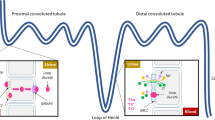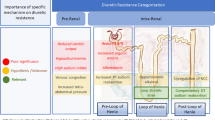Abstract
The recrudescence of interest in manipulation of the arginine vasopressin system and especially of V2 vasopressin receptor blockade in heart failure stems from the limited efficacy and possible detrimental effects of loop diuretics. The ‘braking phenomenon,’ hypertrophy of the collecting duct cells, and altered pharmacodynamics contribute to loop diuretic resistance in heart failure. Selective (tolvaptan) and nonselective (conivaptan) V2 vasopressin receptor antagonists now known as ‘vaptans’ promote free-water excretion that is labeled aquaresis and correct hyponatremia in patients with severe heart failure. A large mortality study with tolvaptan in heart failure is presently ongoing.
Similar content being viewed by others
References and Recommended Reading
Schrier R, Abraham W: Hormones and hemodynamics in heart failure. N Engl J Med 1999, 341:577–585.
Kramer B, Schweda F, Riegger G, et al.: Diuretic treatment and diuretic resistance in heart failure. Am J Med 1999, 106:90–96.
Butler J, Forman D, Abraham W, et al.: Relationship between heart failure treatment and development of worsening renal function among hospitalized patients. Am Heart J 2004, 147:331–338.
Naitoh M, Risvanis J, Balding LC, et al.: Neurohormonal antagonism in heart failure; beneficial effects of vasopressin V (1a) and V(2) receptor blockade and ACE inhibition. Cardiovasc Res 2002, 54:13–15.
GoldsmithS: Vasopressin: a therapeutic target in congestive heart failure. J Card Fail 1999, 5:347–356.
Frishman W, Klaphotz M, Acharya N, Mayerson A: Vasopressin and vasopressin-receptor antagonists in the treatment of cardiovascular disease. In Cardiovascular Pharmacotherapeutics, edn 2. Edited by Frishman WH, Sonnenblick EH, Sica DA. New York: McGraw-Hill; 2003:601–616.
Lee C, Watkins M, Patterson H, et al.: Vasopressin: a new target for the treatment of heart failure. Am Heart J 2003, 146:9–18.
Russell S, DeWald T: Vasopressin receptor antagonists: therapeutic potential in management of chronic heart failure. Am J Cardiovasc Drugs 2003, 3:13–20.
WilcoxC: New insights into diuretic use in patients with chronic renal disease. J Am Soc Nephrol 2002, 13:798–805.
BarterDC: Diuretic response in congestive heart failure. Congest Heart Fail 2000, 6:197–201.
BruyneLKM: Mechanisms and management of diuretic resistance in congestive heart failure. Postgrad Med J 2003, 79:268–271.
Lapman P, Golduber G, LeJemtel T: Heart failure treatment and renal function. Am Heart J 2004, 147:331–338.
Shanker SS, Brater DC: Loop diuretics from Na-K-2Cl transporter to clinical use. Am J Physiol Renal Physiol 2003, 284:F11-F21.
Neuberg G, Miller A, O’Connor C: Diuretic resistance predicts mortality in patients with advanced heart failure. Am Heart J 2002, 144:31–38.
Domanski M, Norman J, Pitt B et al.: Diuretic use, progressive heart failure, and death in patients in the Studies of Left Ventricular Dysfunction (SOLVD). J Am Coll Cardiol 2003, 42:705–708.
Cooper H, Dries D, Davis CE, et al.: Diuretics and risk of arrhythmic death in patients with left ventricular dysfunction. Circulation 1999, 100:1311–1315.
Goldsmith SR, Francis GS, Cowley AW, et al.: Increased plasma arginine vasopressin levels in patients with congestive heart failure. J Am Coll Cardiol 1983, 1:1385–1390.
Nielsen S, Kwon T, Christensen B, et al.: Physiology and pathophysiology of renal aquaporins. J Am Soc Nephrol 1999, 10:647–663.
Hasler U, Mordasini D, Bens M, et al.: Long term regulation of aquaporin-2 expression in vasopressin responsive renal collecting duct principal cell. J Biol Chem 277:10379–10388.
Gerbes AL, Gulberg V, Gines P, et al.: Therapy of hyponatremia in cirrhosis with a vasopressin receptor antagonist: a randomized double-blind multicenter trial. Gastroenterology 2003, 124:933–939.
Wong F, Blei AT, Blendis LM, Thuluvath PJ: A vasopressin receptor antagonist (VPA-985) improves serum sodium concentration in patients with hyponatremis: a multicenter, randomized, placebo-controlled trial. Hepatology 2003, 37:182–191.
DecauxG: Long-term treatment of patients with inappropriate secretion of antidiuretic hormone by the vasopressin receptor antagonist conivaptan, urea, or furosemide. Am J Med 2001, 110:582–584.
Naitoh M, Suzuki H, Murakami M, et al.: Effects of oral AVP receptor antagonists OPC-21268 and OPC-31260 on congestive heart failure in conscious dogs. Am J Physiol 1994, 267:H2245-H2254.
Yatsu T, Kusayama T, Tomura Y, et al.: Effect of conivaptan, a combined vasopressin V(1a) and V(2) receptor antagonist, on vasopressin-induced cardiac and haemodynamic changes in anaesthetized dogs. Pharmacol Res 2002, 46:371–373.
Wada K, Tahara A, Arai Y, et al.: Effect of the vasopressin receptor antagonist conivaptan in rats with heart failure following myocardial infarction. Eur J Pharmacol 2002, 450:169–177.
Nicod P, Waeber B, Bussien JP, et al.: Acute hemodynamic effect of a vascular antagonist of vasopressin in patients with congestive heart failure. Am J Cardiol 1985, 55:1043–1047.
Udelson J, Smith W, Hendrix G, et al.: Acute hemodynamic effects of conivaptan, a dual V1A and V2 vasopressin receptor antagonist, in patients with advanced heart failure. Circulation 2001, 104:2417–2423.
Udelson J, Orlandi C, O’Brien T, et al.: Vasopressin receptor blockade in patients with congestive heart failure: results from a placebo controlled, randomized study comparing the effects of tolvaptan, furosemide, and their combination [abstract]. J Am Coll Cardiol 2002, 39(Suppl 1):156. Combined V2/V1a antagonism holds promise. The V2 antagonist effects are more apparent and the V1a effects are more difficult to interpret but hold promise, if demonstrable in further studies.
Burnett J, Smith W, Ouyang J: Tolvaptan (OPC-41061), a V2 vasopressin receptor antagonist, protects against the decline in renal function observed with loop diuretic therapy [abstract]. J Card Fail 2003, 9:S12.
Gheorghiade M, Niazi I, Ouyang J, et al.: Vasopressin V2-receptor blockade with tolvaptan in patients with chronic heart failure. Circulation 2003, 107:2690–2696.
Gheorghiade M, Gattis W, O’Connor C, et al.: Effect of tolvaptan, a vasopressin antagonist, in patients hospitalized with worsening heart failure. A randomized controlled trial. JAMA 2004, 291:1963–1971. In this study, selective V2 antagonism achieved aquaresis as evidenced by sustained increased sodium, decreased urine osmolality, and increased urine output.
Martin P, Abraham W, Lieming A, et al.: Selective V2-receptor vasopressin antagonism decreases urinary aquaporin-2 excretion in patients with chronic heart failure. J Am Soc Nephrol 1999, 10:2165–2170.
Gheorghiade M, Konstam M, Udelson J, et al.: Vasopressin receptor blockade with tolvaptan in chronic heart failure: differential effects in normonatremic and hyponatremic patients [abstract]. J Am Coll Cardiol 2002, 171A:839–841.
Russell S, Selaru P, Pyne D, et al.: Rationale for use of an exercise end point and design for the ADVANCE (A Dose Evaluation of a Vasopressin Antagonist in CHF Patients Undergoing Exercise) trial. Am Heart J 2003, 145:179–186.
Author information
Authors and Affiliations
Rights and permissions
About this article
Cite this article
Golestaneh, L., Talreja, A. & Le Jemtel, T.H. Vasopressin antagonists in heart failure. Curr Heart Fail Rep 1, 190–196 (2004). https://doi.org/10.1007/s11897-004-0008-5
Issue Date:
DOI: https://doi.org/10.1007/s11897-004-0008-5




